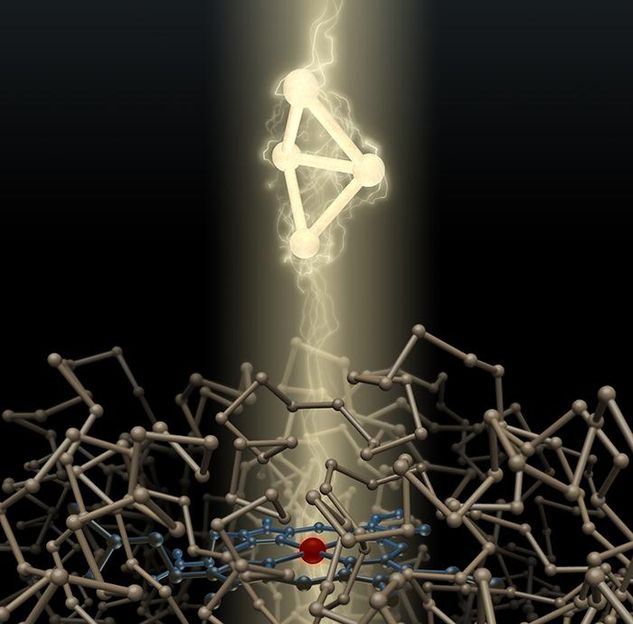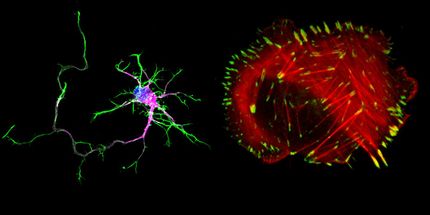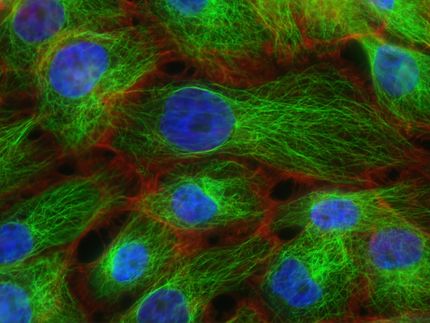Researchers identify phosphorylation process vital to cancer growth
Scientists at VIB-KU Leuven have identified a new mechanism that impacts tumor growth. The typical lack of oxygen in tumors doesn't only stimulate proliferation, but also offsets the important role of the protein PHD2 as 'cancer cell killer'. A possible solution lies in blocking the enzyme PP2A/B55, which restores the function of PHD2 and consequently slows down cancer growth.
Poor prognosis in cancer is typically correlated with hypoxia, a disturbance in the oxygen supply to the tumor cells. The protein PHD2 is known as a 'hypoxic sensor', as its function is highly dependent on the amount of oxygen. In the VIB-KU Leuven Center for Cancer Biology, Dr. Giusy Di Conza and colleagues, led by prof. Massimiliano Mazzone, focused on the phosphorylation -- the addition of a phosphate group -- of this protein.
Interfering in phosphorylation process
When phosphorylated, PHD2 is more active, promoting the death of cancer cells in the low-oxygen areas of the tumor. However, tumors tend to overexpress the phosphatase PP2A/B55, an enzyme that removes the phosphate group ('dephosphorylation') from PHD2. As a result, PHD2 is partially inactivated, which offsets the positive effects of this 'cancer cell killer'.
Prof. Massimiliano Mazzone (VIB-KU Leuven): "Surprisingly, we found that the phosphorylation status of PHD2 is regulated by pathways such as mTOR, which in tumor and normal cells represents the main sensor of metabolic stresses such as lack of nutrients or growth factors. This means that our findings might be applied not only to cancer but also to other diseases, such inflammatory or metabolic diseases."
Phosphatase as a cancer target
During the research, prof. Mazzone's lab collaborated closely with several domestic and foreign researchers. In particular, the German ISAS lab (Dortmund) and the Leuven University Hospital played decisive roles, with the latter providing the human cancer samples necessary for the research. In these samples, the researchers discovered high expressions of PP2A/B55 in tumors compared to healthy tissues.
Prof. Massimiliano Mazzone (VIB-KU Leuven): "This leads us to the conclusion that PP2A/B55 is a promising potential target for cancer therapy. That is why we started working together with an interested partner to study the potential of specific drugs against PP2A/B55. The ultimate goal is to design molecules that block the function of this phosphatase, thereby fighting cancer in a targeted way."
Assessing the effects of future drugs
On top of new cancer treatment perspectives, these findings may also lead to new biomarkers: the phosphorylation status of PHD2 might be instrumental to understanding a tumor's transformation process and, consequently, to select the appropriate treatment.
Prof. Massimiliano Mazzone (VIB-KU Leuven): "To fully understand all the ins and outs of these processes, we also need to take a closer look at the tumor microenvironment and the immune system. After all, they strongly impact tumor growth. As we speak, we are defining the role of PP2A/B55 in both the tumor microenvironment and in immune cells. In this way, we hope to assess the effects of future drugs that inhibit PP2A/B55.”
Original publication
Giusy Di Conza, Sarah Trusso Cafarello, Stefan Loroch, Daniela Mennerich, Sofie Deschoemaeker, Mario Di Matteo, Manuel Ehling, Kris Gevaert, Hans Prenen, Rene Peiman Zahedi, Albert Sickmann, Thomas Kietzmann, Fabiola Moretti, Massimiliano Mazzone; "The mTOR and PP2A Pathways Regulate PHD2 Phosphorylation to Fine-Tune HIF1α Levels and Colorectal Cancer Cell Survival under Hypoxia"; Cell Reports; 2017
Most read news
Original publication
Giusy Di Conza, Sarah Trusso Cafarello, Stefan Loroch, Daniela Mennerich, Sofie Deschoemaeker, Mario Di Matteo, Manuel Ehling, Kris Gevaert, Hans Prenen, Rene Peiman Zahedi, Albert Sickmann, Thomas Kietzmann, Fabiola Moretti, Massimiliano Mazzone; "The mTOR and PP2A Pathways Regulate PHD2 Phosphorylation to Fine-Tune HIF1α Levels and Colorectal Cancer Cell Survival under Hypoxia"; Cell Reports; 2017
Topics
Organizations
Other news from the department science

Get the life science industry in your inbox
By submitting this form you agree that LUMITOS AG will send you the newsletter(s) selected above by email. Your data will not be passed on to third parties. Your data will be stored and processed in accordance with our data protection regulations. LUMITOS may contact you by email for the purpose of advertising or market and opinion surveys. You can revoke your consent at any time without giving reasons to LUMITOS AG, Ernst-Augustin-Str. 2, 12489 Berlin, Germany or by e-mail at revoke@lumitos.com with effect for the future. In addition, each email contains a link to unsubscribe from the corresponding newsletter.
Most read news
More news from our other portals
Last viewed contents
Analytica 2014: New special exhibit for occupational health and safety
VIB-UGent scientist Jirí Friml receives Körber European Science Award 2010 for research on plant hormones and development























































